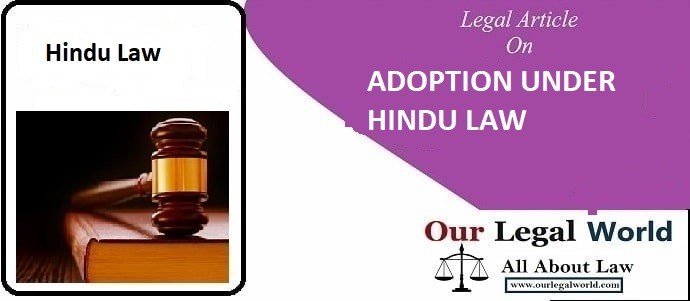ADOPTION UNDER HINDU LAW
INTRODUCTION
An adoption is an act by which a person takes the child from their biological or natural parents to his family and treats him as his own son. The concept of Adoption has been existing since earlier times and it has various views in various legal systems. In ancient times in Hindu law, sonship was considered of greater importance. The son was considered as a substitute for the male issues existing in the family. If a son is born in a Hindu family he is required to perform some duties that is to perform funeral rites and to preserve the continuance of family. So a son is an essential part of the Hindu family.
Later different concepts and views came upon adoption. The modern concept is that it is an act of a person taking a child (son or daughter) into lawful custody and by adoption the adopted child will have all the legal rights and status as that of a natural son.
What is Adoption
In the modern Hindu law the act of adoption is made according to the provisions of the Hindu Adoption and Maintenance Act, 1956. In India the other personal laws such as Muslim Law, Christian Law doesn’t recognize adoption.
In Ramasubbayya v. Chanchu Ramayya adoption was defined as “A juridical act creating between two person certain relations, purely civil, of paternity and affiliation” [1]. According to the Hindu Adoption and Maintenance Act, 1956 Hindu married couples or unmarried adults can only adopt a Hindu child.
What are the essentials of a valid adoption
According to Section 6 of the Hindu Adoption and Maintenance Act 1956, the requisites of a valid adoption is as follows:
1. the person adopting has the capacity and also the right to take in adoption;
2. the person giving in adoption has the capacity to do so;
3. the person adopted is capable of being taken in adoption and;
the adoption made in compliance with the other conditions mentioned in the Act.
Who can be adopted
According to Section 10 of the Hindu Adoption and Maintenance Act 1956, any child (son or daughter) can be adopted by the following conditions:
1. The child should be Hindu.
2. The child has not been adopted before.
3. The child should not be married.
4. The age of the child must be below 15 years.
According to Section 11 of the Act, If a son or daughter is adopted the adoptive father or mother must not have a living son, son’s son, son’s son’s son (either by legitimate blood relationship or by adoption) living at the time of adoption, in the case of son and in the case of daughter there must not have a living daughter or son’s daughter (either by legitimate blood relationship or by adoption) living at the time of adoption.
Other essentials of a valid adoption
The other essentials of a valid adoption is as follows:
i. if the adoption is by a male and the person to be adopted is a female, the adoptive father is at least twenty-one years older than the person to be adopted;
ii. if the adoption is by a female and the person to be adopted is a male, the adoptive mother is at least twenty-one years older than the person to be adopted;
iii. the same child may not be adopted simultaneously by two or more persons;
iv. the child to be adopted must be actually given and taken in adoption by the parents or guardian concerned or under their authority with intent to transfer the child from the family of its birth or
v. in the case of an abandoned child or a child whose parentage is not known, from the place or family where it has been brought up to the family of its adoption.
Adoption by Men
Section 7 of the Hindu Adoption and Maintenance Act, 1956 states that any Hindu male who is major, is of sound mind, is eligible to adopt a child. If he is married then the free consent of the wife is also needed for adoption. But if the wife has renounced the world or ceased to be Hindu or a court of competent jurisdiction declared that she is of unsound mind, then no consent is needed.
Also if the person has more than one living wife at the time of adoption, then consent of all the wives is necessary for adoption. Thus adoption without the consent of wife is void. The adoption conducted during wife’s pregnancy is valid. Such adoption will not be affected by subsequent birth of a male or female child, and both biological and adopted child will have equal rights over property [2].
Adoption by Women
Section 8 of the Hindu Adoption and Maintenance Act, 1956 states that any female Hindu who is major, is of sound mind, who is not married is eligible to adopt a child. If she is married then consent of the husband is needed. Earlier if the female Hindu was married she cannot adopt even with the permission of husband, later this was amended.
But if the marriage is dissolved or if her husband is dead or has renounced the world or has ceased to be a Hindu or a court of competent jurisdiction has declared that he is of unsound mind, then no consent is needed. Subsequent marriage of the adoptive female Hindu cannot invalidate the adoption [3].
The adoption by a divorced wife and widow is also recognized by the Hindu Adoption and Maintenance Act, 1956. After divorce the status of women become independent her position will be like that of an unmarried female.
A widow can adopt a child for herself and after adoption she will become the adoptive mother of the child. A son adopted by a Hindu widow would be deemed to be the son of her late husband also [4].
Who can give in adoption
Section 9 of the Hindu Adoption and Maintenance Act, 1956 lists out the person’s capable of a valid adoption. Only the father, mother or the guardian of a child have the capacity to give the child by adoption.
A father will have the right to give in adoption with the consent of the mother. But if the mother is dead or completely and finally renounced the world or has ceased to be a Hindu or has been declared by a court of competent jurisdiction that she is of of unsound mind, then no consent is needed.
A mother will have the right to give in adoption with the consent of the father. But if the father is dead or completely and finally renounced the world or has ceased to be a Hindu or has been declared by a court of competent jurisdiction that he is of of unsound mind, then no consent is needed.
What are the effects of adoption
Section 12 of the Hindu Adoption and Maintenance Act, 1956 states about the effects of adoption. An adopted child will have all the rights as that of a natural child. If the adopted child have any property with him it will be continued to remain with him after the adoption also. If certain restrictions is upon the child in marrying someone such as degrees of prohibited relationship according to Hindu Marriage Act, 1956 that will be continued after adoption also.
Once an adoption is conducted it will be final, and the adopting parents cannot cancel it at any circumstances. Also the child cannot renounce and cannot go back to the old family.
Also Read: Void and Voidable Marriage under Hindu Marriage Act, 1955
CONCLUSION
Adoption is a social institution that has undergone many changes with the passage of time. The concept and objectives of adoption has changed drastically from time to time. In Hindu law the earlier motive of adoption was religious, but now the concept has changed. The only personal law which allows adoption in India is the Hindu Law. Other personal laws like Muslim Law, Christian Law doesn’t have the provisions for adoption, so they want to approach the court for adoption under the Guardians and Wards Act, 1890.
REFERENCES
- Ramasubbayya v. Chanchu Ramayya, AIR 1947 P.C 124
- Guramma Bhratar Chanbasappa v. Malappa, 1964 AIR 510, 1964 SCR (4) 497
- Narinderjit Kaur v. Union of India, AIR 1997 P&H 280
- Sawan Ram v. Kalawati, AIR 1967 SC 1761
- https://indiankanoon.org/doc/1340229/




![Call for Campus Ambassadors by Our Legal World [2 Months; Virtual]: Apply by June 15](https://www.ourlegalworld.com/wp-content/uploads/2024/06/Logo-New-136x150.png)


